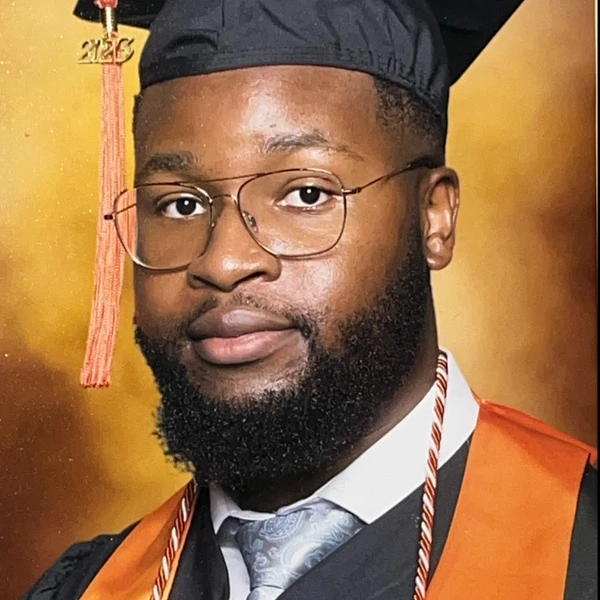
Eustace Ohuakanwa
695
Bold Points1x
Finalist1x
Winner
Eustace Ohuakanwa
695
Bold Points1x
Finalist1x
WinnerBio
Eustace Ohuakanwa is an incoming medical student at the University of Kansas School of Medicine and holds a B.S. in Biomedical Engineering from the University of Texas at Austin. Driven by a commitment to clinical advocacy, he aspires to amplify the voices of marginalized and underserved communities within healthcare. Through research, outreach, and patient-centered care, Eustace seeks to bridge gaps in access and equity, ensuring that every individual receives the compassionate, high-quality medical support they deserve.
Education
University of Kansas
Doctoral degree program (PhD, MD, JD, etc.)Majors:
- Medicine
The University of Texas at Austin
Bachelor's degree programMajors:
- Biomedical/Medical Engineering
Miscellaneous
Desired degree level:
Doctoral degree program (PhD, MD, JD, etc.)
Graduate schools of interest:
Transfer schools of interest:
Majors of interest:
Career
Dream career field:
Medicine
Dream career goals:
Public services
Volunteering
UT-Austin UNIVERSITY HEALTH SERVICES (UHS) — UHS Urgent Care Clinic Volunteer2022 – 2023
TRAM Panacea Scholarship
WinnerAccess to quality healthcare remains one of the most powerful determinants of health—and underserved and uninsured patients feel its absence most acutely. Growing up as a DACA recipient, I’ve experienced firsthand how legal and financial barriers can shut the door on essential services. Ineligible for federal student loans, I’ve shouldered over $500,000 in private debt simply to pursue my medical ambitions. Completing a B.S. in Biomedical Engineering at the University of Texas at Austin while managing that burden taught me resilience and resourcefulness, and it gave me a window into the daily anxieties of families forced to choose between groceries and prescription refills. Those pressures instilled in me a deep empathy for patients whose needs extend far beyond diagnoses and prescriptions.
During my undergraduate years, I volunteered at free clinics in Austin and coordinated community health fairs in Kansas City. I saw how advanced technologies—wearable biosensors, smart drug–delivery platforms, even point-of-care diagnostics—remain out of reach when insurance status dictates who benefits. To address this gap, I led Spanish-language workshops on diabetes prevention, translating complex medical guidance into clear, culturally relevant steps. I navigated referral networks for uninsured cancer patients, ensuring they could access specialist visits at minimal cost, and partnered with local nonprofits to provide transportation vouchers for prenatal appointments. In each encounter, I learned that improving access often means dismantling social, linguistic, and logistical barriers one health-literacy seminar or bus pass at a time.
As an incoming medical student at the University of Kansas School of Medicine, I am committed to turning these lessons into sustained impact. I plan to integrate engineering undergraduates into student-run clinics, pairing technical innovation with real-world patient needs: designing low-cost telehealth platforms tailored to Medicaid populations, prototyping mobile health units equipped for rural outreach, and creating open-source tools for community health workers. Simultaneously, I will advocate for state-level policies that expand community health worker programs in medically underserved areas, leveraging my understanding of health systems and my lived experience of marginalization to inform pragmatic solutions. In every research project, service initiative, and policy discussion, I will center the voices of those who know the system best—patients themselves.
By combining my technical training, my journey through legal and financial adversity, and my passion for clinical advocacy, I aspire to build a practice where access is not a privilege but a guarantee. In my future clinic, patients will encounter not only cutting-edge care but also advocates who understand their fears, respect their stories, and walk beside them through every hurdle. Ensuring that no one is left unheard or untreated will be the foundation of my career—and the measure of my success.